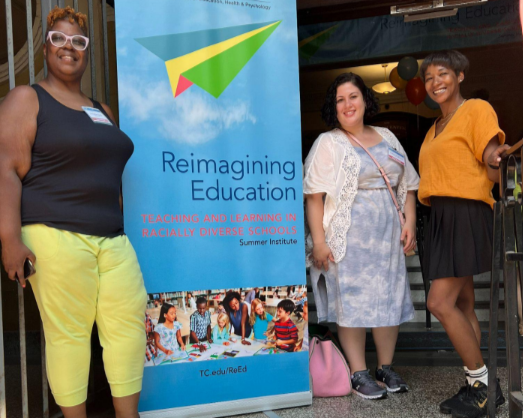Reimagining Education: Teaching, Learning and Leading for a Racially Just Society Summer Institute
April 04, 2024
Middle School Counselor Gaby Barro and Middle School Teacher Denielle Patterson used a PA grant to attend the “Reimagining Education: Teaching, Learning and Leading for a Racially Just Society Summer Institute.” Here is their report.
Thank you to the PA for providing us with an opportunity to attend the Reimagining Education Summer Institute (RESI) at Teachers College, Columbia University last summer. RESI provided us with rich programming and spaces to explore reimagining education for a more racially just society. The four-day professional development institute focused on themes of “Why Reimagine? Racial and Cultural Literacy, Equity Pedagogy, and Culturally Responsive Leadership.” The overarching theme of RESI 2023 was “Antiracist Education: It’s Just Good Teaching.” Our goal for attending the RESI summit was learning more about inclusive teaching skills and how to continue to foster an antiracist community in the middle school.
We truly found this one-of-a-kind experience beneficial and informative. We had opportunities to focus on supporting Asian American students; equitable classroom instruction; and decolonizing educational models. One workshop was about fostering empathy and critical thinking through engagement with underreported news stories on racial justice. We also participated in a workshop on working beyond conflict through the use of African Centered Restorative Justice, looking at how restorative justice takes place in Tanzania, Ghana, and Gullah Island.
Ezekiel Dixon-Roman, Teachers College Professor and Institute for Urban and Minority Education Director, presented on AI in education in relation to racial and cultural literacy, and how race matters when institutions use systems and software to address issues.
The keynote speaker was Dr. Gholdy Muhammad, an associate professor of language and literacy at Georgia State University and a leading expert in supporting teachers and educators in creating culturally responsive curriculum. Dr. Muhammad is also the author of the new book Cultivating Genius: An Equity Framework for Culturally and Historically Responsive Literacy. Dr. Mohammad shared her framework on Culturally and Historically Responsive Teaching, including “The 4 Pursuits”: Identity, Intellect, Criticality, and Joy.
Part of Dr. Muhammad’s framework is the greater idea of pursuits, calling for liberation and empowerment, as opposed to just teaching skills. Dr. Muhammad notes that the focus on skills and standards in classrooms obstructs educators’ efforts to encourage students to think critically and engage in social emotional learning. Dr. Muhammad emphasizes that lessons and curriculum that are focused on meeting standards fail to engage students of diverse backgrounds and cultures. This Historically Responsive Literacy framework emphasizes identity, intellect, and critical thinking as much as meeting educational standards and teaching skills. Dr. Muhammad believes that using this foundational framework and collectively focusing on the goals of identity, intellect, criticality, and joy are beneficial for all students.
A useful resource we came across is the Educator Self-Reflection Tool, created specifically for lesson planning, which allows teachers to consider whether their content touches upon Dr. Muhammad’s four pursuits. The Educator Self-Reflection Tool encourages teachers to “examine, cultivate, teach, model, and coach” for each lesson.
This tool helps teachers in all content areas, to target identity development, intellect, and critical thinking skills all while teaching a specific academic skill. The consideration of fun and enjoyment during lesson planning is a major part of Dr. Muhammad’s work. Dr. Muhammad’s books, Cultivating Genius and Unearthing Joy, are available in the building. We look forward to teachers and educators rethinking their teaching goals and objectives to include more social emotional learning, inclusivity, and of course, joy.We hope to use this information to support teachers in the middle school community in developing culturally responsive learning within their own content areas.
